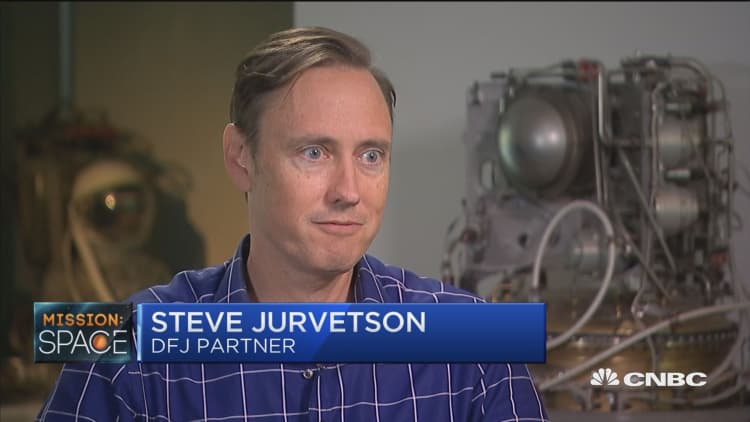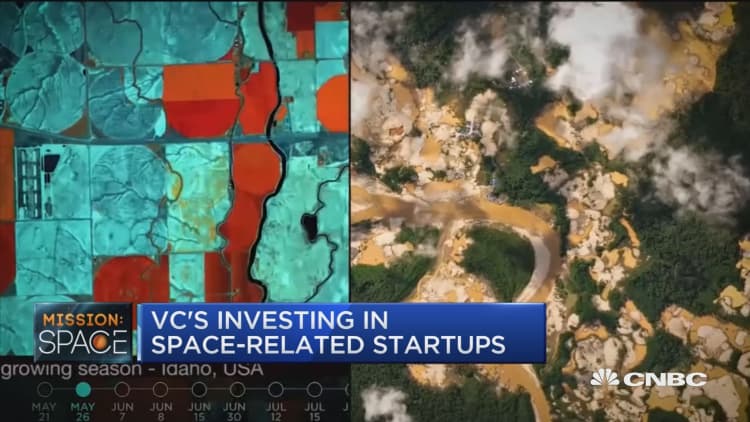
It's not just ride-hailing apps and food-delivery start-ups anymore: Venture capitalists are now also exploring space for outsize returns.
Since January, investors have committed more than $200 million across 20 space-related deals, according to CB Insights. This is in addition to the $2.3 billion that they invested in 2015.
Steve Jurvetson, a partner at Draper Fisher Jurvetson, is an investor in space start-ups including private rocket builder SpaceX. He hopes his colleagues in Silicon Valley are motivated to invest in such start-ups because they are enthusiastic about exploring the frontiers of the unknown. But he acknowledges the more likely reason that they are committing capital to space: the prospect of attractive returns.
"This is an industry that has been sheltered from competition for decades, and there's an enormous pool of money to be made in launching satellite networks and new rockets," Jurvetson told CNBC. "Space now has opened up for commercial activity."
Thanks to powerful technology trends such as big data analytics and cloud computing as well as the increased efficiency and drop in price of electronic components, entrepreneurs can exploit money-making opportunities in space. In fact, there is a constellation of such start-ups now attracting investment and interest.
The most well-funded start-ups include SpaceX; OneWeb, which uses satellites to provide high-speed internet access; Blue Origin, the start-up founded by Amazon's Jeff Bezos; satellite-builder Planet; and Kymeta, a company backed by that sells small satellite antennas to expand connectivity around the world.
Venture capitalists say interest in space is increasing.
"Silicon Valley has been known to inspire herd-like behavior," says Peter Hebert of Lux Capital, which has put money to work in Kymeta, Planet and Orbital Insight, a company backed by Google that processes and analyzes images from satellite developers.

Hebert adds, "Not a week goes by that I don't get outreach from some institutional investor looking for a space investment."
Space-focused start-ups often are trying to upend and redefine established industries. For example, San Francisco–based Planet builds small, 8-pound satellites to orbit Earth and capture images of the entire globe.
The satellites, called "doves," are flown by companies like SpaceX to the International Space Station. From there, astronauts gather the satellites and send them into orbit. Currently, some 60 doves circle the Earth.
Planet has raised $183 million from investors, and signed contracts with more than 100 customers. These customers include the Amazon Conservation Association, which uses its images to identify illegal gold mining in Peru, as well as agricultural giants such as Bayer CropScience, which uses the data to gauge the health and yield of crops.
Planet co-founder and CEO Will Marshall, a former NASA scientist, notes that his satellites' images do not boast the same resolution as legacy satellite builders such as Airbus, but says they cover far more of the Earth's surface — and more frequently — than those established players.
Airbus did not respond to requests for comment.
VCs acknowledge challenges for space-related start-ups, including the need for more frequent and reliable commercial rocket launches. They also maintain that there are not enough software engineers to meet the demands of this market.
Still, investors like Jurvetson remain excited about the potential of the technology that is to come. He says we are now on the cusp of space travel to the moon and beyond.
Within the next four years, he also envisions start-ups like SpaceX launching thousands of satellites into orbit, which will connect more of the world to the web.
"We will go from 2 billion people online to 6 billion people online much faster than anyone ever thought, because these satellite networks will offer coverage everywhere," he says. "It will be one of the biggest economic shifts we've ever seen."
Given recent technological advances and the amount of money supporting these space start-ups, the stars and moon might indeed be aligned to make these projections a reality.


